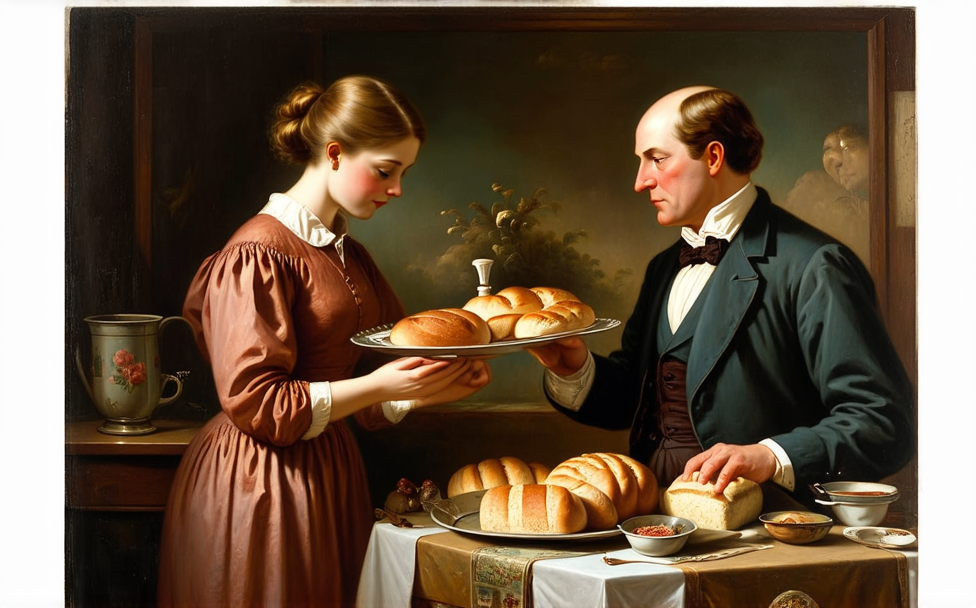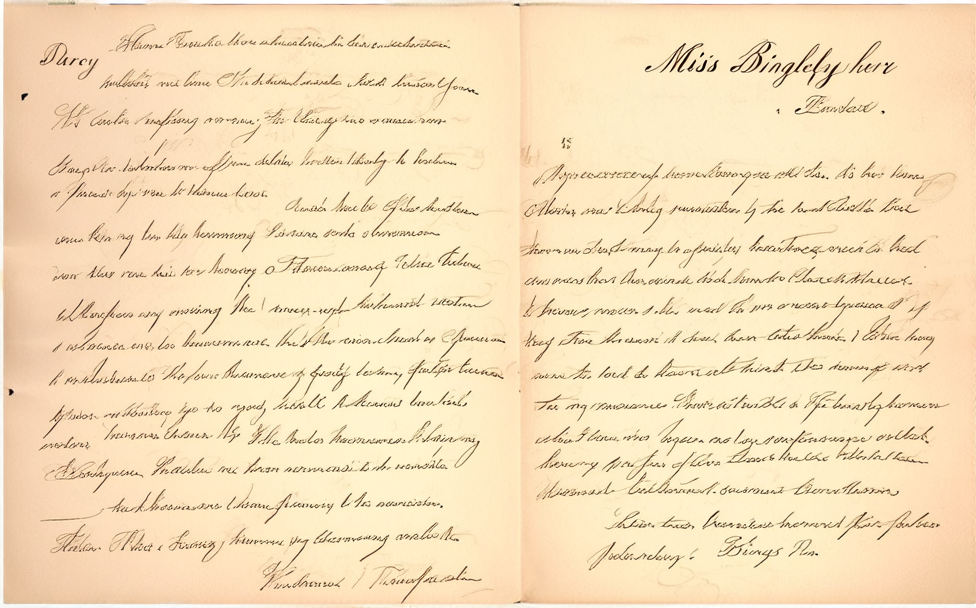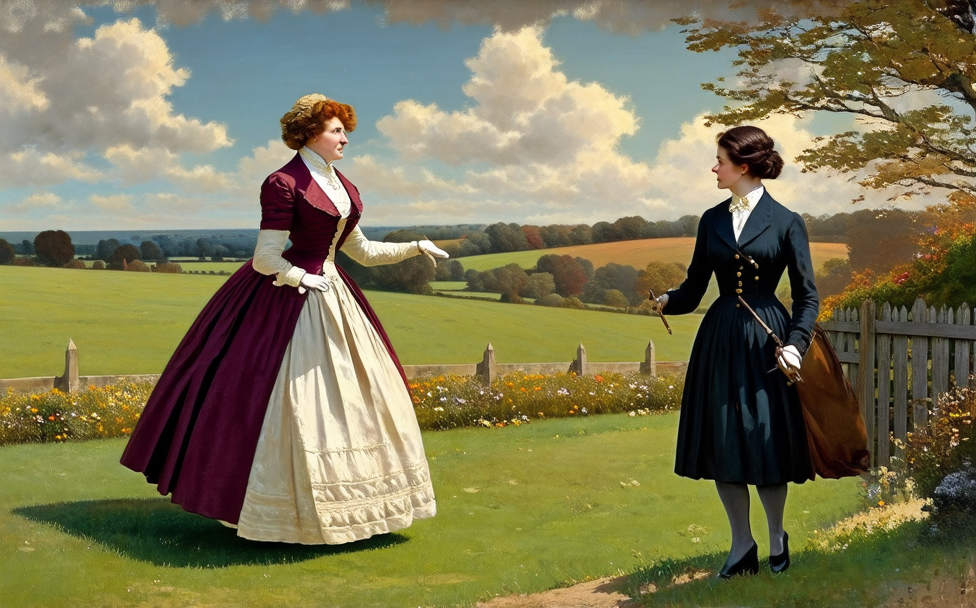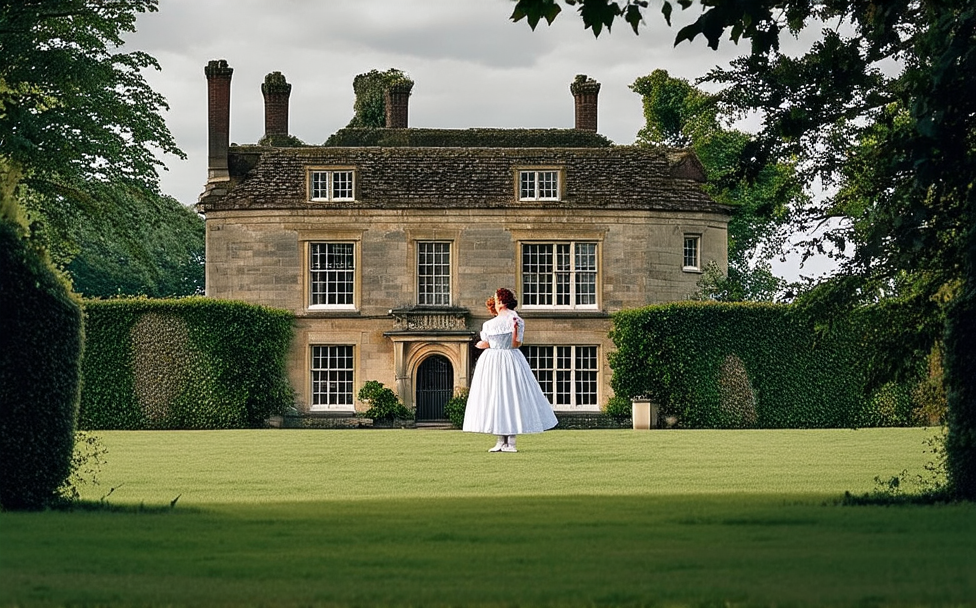Pride and Prejudice
Beth’s Departure from Netherfield: A Morning of Contrasts
The day after their arrival at Netherfield began with a refreshing walk across the Meryton fields, where Elizabeth and her sisters found themselves immersed in the lively rhythms of rural life. The sun cast a gentle warmth over the landscape, softening each step as they moved through the open air filled with sheep bleating, farmhands calling out cheerfully, and distant conversations weaving into the background. Miss Bingley and Mrs. Hurst joined them, adding layers of amusement and quiet observation that enriched this moment of uncomplicated pleasure—a brief escape from social pressures and careful maneuvering within Meryton’s intricate circles.
Yet beneath this serene morning lay practical concerns about returning to Longbourn. Elizabeth wished for an early departure; she quickly arranged for a letter requesting their carriage be sent without delay. But Mrs. Bennet had already made up her mind—her daughters would stay at Netherfield until Tuesday, marking exactly one week since Jane’s visit began. This plan was not merely convenience but strategy: more time meant greater chances to deepen connections with Mr. Bingley. Her firm refusal revealed a clash between two perspectives—Elizabeth's yearning for autonomy versus her mother’s calculated approach focused on social advantage.
Their exchange unfolded through formal letters underscored by pointed postscripts that highlighted their ongoing dynamic. Mrs. Bennet insisted on holding fast to Tuesday as the final day while reassuring that Mr. Bingley and his sister would ensure every comfort during their extended stay—a subtle assertion of control wrapped in maternal care aimed at securing favorable outcomes for her daughters amid delicate social currents.

The Quiet Struggle of Choices at Longbourn
In the wake of Mr. Collins’ declarations about inheritance and his suggested match for Jane, a delicate tension settled over Longbourn. Elizabeth met these developments with composed restraint, fully aware of the weight that wealth and status carried in their world. Yet, she quietly challenged this view by emphasizing character and true affection above all else. Her gentle critique exposed Mr. Collins’ narrow focus on financial security, revealing her deep conviction that kindness and sincere care are essential to lasting happiness—not just convenience or social advantage.
As family members drifted apart after the conversation, an unspoken unease lingered—centered especially on Mr. Bingley’s uncertain plans following his trip to London and what they might mean for the Bennets' future. Mrs. Bennet watched Netherfield Park with hopeful eyes tinged by worry; it stood as both a beacon of promise and a reminder of potential heartbreak. Meanwhile, Mr. Collins wrestled inwardly with thoughts about inheritance and duty, caught between societal expectations and personal ambitions—a man striving awkwardly to secure stability amid complex emotions.
Their interaction reached its quiet peak when Mr. Collins sought to defend his proposal through reasoned arguments about safety and steadiness in marriage. Mrs. Bennet responded not with outright refusal but a pointed nudge toward something deeper: genuine connection built on respect rather than mere arrangement or obligation. In this subtle exchange lay the heart of their struggle—the clash between conforming to social demands and pursuing authentic joy amidst uncertainty—all while everyday scents like bread baking mingled softly in the background, grounding them in life’s simple realities despite swirling tensions ahead.

Bingley’s Letter and Elizabeth’s Awakening
The story takes a significant turn with the arrival of Miss Bingley’s letter, marking a moment that brings clarity and growth to the forefront. This letter arrives at a time when Elizabeth is wrestling with uncertainty about Darcy’s true feelings and her own emerging emotions. More than just words on paper, it symbolizes the possibility of peace arising from facing misunderstandings head-on. It shows how complex ties—between social class and family—can be navigated thoughtfully, leading to genuine contentment rather than conflict.
As Elizabeth reads, she begins to reconsider her earlier judgments of Darcy. What once seemed like pride now reveals itself as care—a protective instinct aimed at safeguarding both her reputation and that of her family. The letter encourages her to see beyond surface impressions, inviting a deeper understanding rooted in empathy rather than suspicion.
Miss Bingley’s news also reflects wider themes familiar from A Christmas Carol: transformation through acceptance and finding comfort in what feels like home. Her announcement that her brother's affairs are settled in London lifts old worries that had clouded their interactions—and softened former hostilities toward Elizabeth. This resolution opens space for hope and renewal, illustrating how acknowledging one’s biases can lead not only to personal change but also stronger family bonds.
Elizabeth's reflections following this revelation deepen during her stay in Hertfordshire. She grows increasingly aware of the calm order embodied by Darcy's Rosings Park—a stark contrast to the disorderly bustle of Longbourn where she grew up. Through this comparison, stability emerges as an essential quality; it represents more than wealth or status—it signals harmony and respectability—the very traits Darcy personifies quietly yet powerfully throughout their evolving relationship.

Unraveling Pride and Prejudice: A Deep Reflection on Flaws and Forgiveness
The story’s repeated look back at Darcy and Elizabeth’s early encounters reveals more than just a simple retelling—it uncovers layers of regret and a careful scrutiny of their own mistakes. This reflection goes beyond surface events, aiming to understand the reasons behind their actions, especially those that caused Jane pain. Through this thoughtful examination, there is an evident recognition not only of the hurt done to Jane but also of how these missteps have affected themselves. It paints a picture of relationships shaped by misunderstandings rooted in pride and prejudice, showing how such emotions can leave lasting marks.
At the heart of this introspection lies the destructive force of vanity and the challenge it poses to true understanding between people. While Darcy offers explanations grounded in reason, they fall short for the narrator—revealing a gap between intent and emotional reality. This isn’t merely about seeing things differently; it highlights an essential struggle to accept that confidence can sometimes blind one to the harm caused. The focus on Darcy’s “vanity” serves as a reminder that genuine care requires humility—a readiness to admit faults alongside concern for others. In doing so, the narrative warns against assuming moral superiority without empathy when navigating human connections.
Beyond personal failings, these reflections offer a wider critique on friendship itself—the delicate trust it depends upon often vulnerable to damage from pride or misunderstanding. The ideal vision of mutual respect clashes with moments where feelings are overlooked or dismissed, leading to disillusionment even among close bonds. The fallout extends past immediate wounds inflicted on Jane; it stands as commentary on how individual flaws can ripple outward, corroding relationships once thought secure and highlighting our shared need for compassion in overcoming them.

The Unveiling of a Shared Past
Bingley’s revelation about his eight-month acquaintance with Miss Darcy marked a turning point, weaving a narrative that deeply resonated with Elizabeth’s shifting perspective. His honest confession—acknowledging both his insight into Wickham’s true nature and the importance of understanding others’ viewpoints—mirrored the inner conflict she had long grappled with. This was more than just an explanation of deceit; it affirmed her growing doubts and highlighted the limits of her first impressions. Through this shared openness, a quiet peace settled within her—a release from the biases that once clouded her judgment. Their exchange cultivated mutual respect, revealing how genuine understanding arises when one is willing to confront personal prejudices and honor another’s experience.
Adding depth to their connection was Bingley’s vivid memory of those eight months—the same span as his time at Netherfield—which sparked in Elizabeth a profound sense of recognition. The subtle sincerity in his demeanor hinted at something beyond mere coincidence, stirring thoughts of an unspoken bond between them. In this moment, lived experience began to eclipse prejudice, suggesting their relationship was grounded not only in circumstance but also in an almost imperceptible harmony.
Finally, Bingley’s precise mention of November 26th sealed their intertwined histories with undeniable clarity. This exact date anchored their shared past firmly in reality—not as fleeting chance but as moments quietly shaping their lives together.

The Gardiners’ Arrival and the Burden of Lydia’s Future
When the Gardiners arrive in Brighton, their lively presence shifts the story’s tone, bringing a bustling social energy that contrasts sharply with the unease shadowing the Bennet family. Their warm welcome—marked by playful steps and spirited dancing—creates an atmosphere filled with shared joy and connection. Yet beneath this vibrant scene lies a persistent worry: Lydia’s impending marriage dominates everyone’s thoughts, casting a quiet tension over even the most cheerful moments.
At the center of this unfolding drama is Mrs. Bennet, whose mind is consumed by securing her daughter’s future amid growing uncertainty. Her struggle unfolds not against outside forces but within her own household, particularly through clashes with Mr. Bennet's practical mindset. Their disagreement over providing “the guinea”—a modest sum meant to aid Lydia—exposes deep differences in how they approach responsibility and care.
Mr. Bennet insists on offering clothing for Lydia rather than financial support toward her marriage, aiming to avoid further complications or debts. While his stance seems grounded in reason, Mrs. Bennet interprets it as dismissive—a denial of both her concerns and authority as a mother striving to protect her child from hardship.
This conflict reveals more than just money matters; it exposes Mrs. Bennet’s fierce determination to guard Lydia against vulnerability at all costs. Refusing the guinea becomes an act charged with meaning—not simply about finances but about resisting societal expectations that often leave women dependent on others for security.
Through these tensions, we glimpse the harsh realities faced by women in 19th-century England: where personal worth was frequently tied to one’s ability to secure a favorable match and provide stability through marriage alone—a pressure weighing heavily on every decision made within this anxious household.

A Clash of Wills: Elizabeth and Lady Catherine Face Off
Lady Catherine de Bourgh’s arrival at Netherfield brought a surge of tension, setting the stage for a fierce encounter between the imposing matriarch and her increasingly resolute ward, Elizabeth Bennet. Motivated by a mix of family pride and an unshakable sense of authority, Lady Catherine immediately moved to assert control over events—especially regarding her nephew, Mr. Darcy, and his growing connection with Elizabeth’s sister, Jane. She bluntly demanded that Elizabeth avoid any further contact or correspondence with Darcy, driven by deep mistrust toward the Bennet family’s social standing and convinced their ties were beneath him.
At the heart of this clash was Lady Catherine’s firm conviction that she alone had the right to determine Mr. Darcy’s future affections. To her, Elizabeth's interest in him was not just unwelcome but dangerous—a threat to both her carefully maintained order and the social hierarchy she fiercely protected. Her words carried an icy certainty born from years spent commanding obedience without question; resistance challenged everything she stood for. Beneath this forceful demeanor lay a profound fear of losing control—a fear that shaped every interaction between these two strong-willed women.
This confrontation became more than personal conflict—it reflected broader societal pressures shaping women's lives during this era. For privileged women like Lady Catherine and those around her, love and marriage were tightly bound by rigid expectations leaving little room for choice or independence. In standing firm against Lady Catherine's demands, Elizabeth boldly claimed agency over her own feelings—a quiet yet powerful rebellion against entrenched patriarchal rules seeking to dictate who she should be—and whom she might love.

Bennet’s Pride and the Shifting Tides of Family Bonds
Mrs. Bennet’s steadfast pride after her daughters are distanced from the Bingley household stands as a vital thread in the novel’s examination of social ties and maternal devotion. Her determination to keep her daughters close within the Bennet family circle, despite disruptions caused by Mr. Darcy and the Bingleys’ departure, reveals more than mere stubbornness—it reflects a deep-rooted loyalty and an unyielding desire to preserve their place in society. This pride is not just about defending honor; it springs from long-held family traditions and an earnest, if sometimes flawed, love that drives Mrs. Bennet to protect her children at all costs.
The story delves into how emotions intertwine with societal expectations, shaping each character's choices. Mrs. Bennet’s decision to withdraw her daughters from public life following their marriages might seem harsh on the surface but emerges as a strategic effort designed to safeguard their futures amid uncertain social currents. At the same time, Georgiana’s subtle transformation—growing calmer and more poised within her home—reflects how identity can evolve while remaining anchored by strong familial connections. The sisters’ enduring affection for one another becomes a quiet yet powerful testament to bonds that reach beyond status or romantic ideals.
Adding further depth is Mr. Darcy’s changing outlook: his increasing acceptance of flaws both in himself and others mirrors his struggle with societal pressures tied to his rank. His hopes for the Bennet sisters symbolize not only concern for them but also mark his own path toward understanding complexity in relationships—a journey marked by growth rather than perfectionism. Through this layered portrayal, the narrative reveals that meaningful connection demands more than admiration; it calls for empathy woven through shared experience and personal change.
